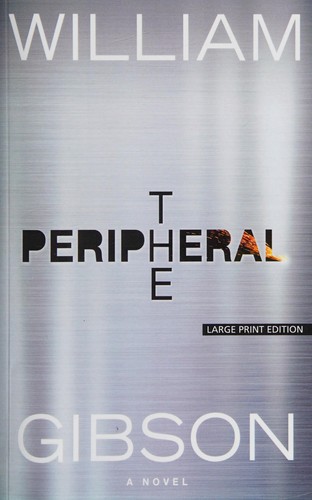Keith Stevenson reviewed The peripheral by William Gibson (duplicate)
Review of 'The peripheral' on 'Goodreads'
3 stars
My review of The Peripheral originally appeared on The Newtown Review of Books
William Gibson is one of the most famous science fiction authors of the modern age. His now classic Sprawl Trilogy, Neuromancer, Burning Chrome and Mona Lisa Overdrive, heralded in the era of cyberpunk, concerned with that shadowy interface between humans and self-aware artificial intelligences, which saw its cinematic culmination in the Matrix movies. The cyberpunk worlds he created were visceral and grungy. His was no gleaming, smooth-surfaced future, but one where hackers jury-rigged their way into non-real dataspaces to fight megacorporation black-ice security programs that would leave their synapses fried if they made one wrong move. It was heady stuff for readers who – in the real world – thought Microsoft Windows was pretty cool.
The Sprawl was a tough act to follow and after his initial success there followed a handful of novels that failed to cut through with the reading public as successfully as his other works. But Pattern Recognition, published in 2003, was hailed as a return to form, showing a sort of ‘five-minutes-into-the-future’ world that successfully highlighted our preoccupation with style over substance, concentrating as it did on the search by ‘brand whisperer’ Cayce Pollard for the origin of ‘the footage’, a series of obscurely connected film clips much prized by cool hunters. While the plot and protagonist were engaging, the book’s main drawcard was Gibson’s ability to create a detailed, functional near-future that felt completely real while you were reading it.
Spook Country and Zero History followed, again creating that immersive experience of a world that was familiar and disorienting in equal parts. They also utilised a thriller/ mystery framework to hang the story from, but in both cases the resolutions were less satisfying than in Pattern Recognition and perhaps hinted at a disconnect between the author’s intentions and the needs of the reader.
All this brings us to The Peripheral, which hits the high-water mark in terms of engaging the reader’s imagination and intellect, but is less successful in delivering the pace, tension and emotional investment expected of a thriller.
Flynne scrabbles out a living in the near-future United States doing piecework at a 3D print shop. Her brother Burton, who lives in a trailer on their property, is a veteran invalided out of whatever Middle East conflict the US was most recently embroiled in and plagued by uncontrollable shudders due to the surgical removal of his combat enhancements. There’s little real work around, the economy is down the tubes and the corporatisation of America seems all but complete. Smart phones are smarter than ever and other tech we can only currently imagine is easily available, but everything is covered by a greasy miasma, right down to the cardboard rental cars running on chicken fat:
Coming down the path, she saw stray crumbs of the foam, packed down hard in the dark earth. He had the trailer’s lights turned up, and closer, through a window, she partly saw him stand, turn, and on his spine and side the marks where they took the haptics off, like the skin was dusted with something dead-fish silver. They said they could get that off too, but he didn’t want to keep going back.
… Inside, the trailer was the colour of Vaseline, LEDs buried in it, bedded in Hefty Mart amber. She’d helped him sweep it out, before he moved in. He hadn’t bothered to bring the shop vac down from the garage, just bombed the inside a good inch thick with this Chinese polymer, dried glassy and flexible. You could see stubs of burnt matches down inside that, or the cork-patterned paper on the squashed filter of a legally sold cigarette, older than she was.
… Now he just got his stuff out before he hosed the inside, every week or two, like washing out Tupperware. Leon said the polymer was curatorial, how you could peel it all out before you put your American classic up on eBay. Let it take the dirt with it.
While sitting in for her brother, who’s moonlighting as a security drone operator, Flynne witnesses a murder and, very quickly after, Lev Zubov, her brother’s employer, contacts her and reveals that the company her brother works for is run from the future, which is where the murder she saw took place. But this is much weirder than a simple time travel tale. A computer server somewhere in China has inadvertently allowed information to flow between the future and the past:
‘You might begin by explaining this hobby of yours, Mr Zubov. Your solicitors described you to me as a “continua enthusiast”.’
‘That’s never entirely easy,’ said Lev. ‘You know about the server?’
‘That great mystery, yes. Assumed to be Chinese, and as with so many aspects of China today, quite beyond us. You use it to communicate with the past, or rather a past, since in our actual past, you didn’t. That rather hurts my head, Mr Zubov. I gather it doesn’t hurt yours?’
‘Far less than the sort of paradox we’re accustomed to culturally, in discussing imaginary transtemporal affairs,’ said Lev. ‘It’s actually quite simple. The act of connection produces a fork in causality, the new branch causally unique. A stub, as we call them.’
The stage is set for a time war, with Flynne engaged by Lev’s side to identify who was responsible for the murder while the murderer – who remains in the shadows for most of the book – hires assassins in the past to kill her. Lev sends back plans for a telepresence rig that allows Flynne to inhabit a ‘peripheral’ located in his time – basically a human facsimile without a mind – in order to help finger the killer. It’s during one of these telepresence trips that she learns about the ‘jackpot’, a sharp dividing line between Flynne’s time and the future: a multi-modal cataclysm that killed 80% of the world’s population even while it left the survivors in control of technological advances that enabled some among them to create kleptocracies – fantastically powerful nation states run by robber barons who take what they want with impunity. But if Flynne’s timeline has split off from the main branch, the jackpot may be avoidable.
The real joy of the novel is found in the detailed inspection of the technological, social and political landscapes of both these future times as well as continual extrapolations of the effects of time-travel communication and how it impacts on the characters in both time streams. When attempts to kill Flynne fail, both sides move on to economic warfare, using agents in the past to buy up huge amounts of stocks and shares and eventually entire corporations in order to get the upper hand. Flynne and Burton become controlling shareholders on one side of this economic arms race, which grows so quickly it threatens to topple the entire US economy before the government is prompted to act against them.
As with Gibson’s previous books, the detail and the world-building is immersive and the extrapolation is superb, but less attention is paid to the thriller aspect of the book, so while my imagination was fully engaged, my emotions were less so. I didn’t feel any real jeopardy for the characters, and action scenes were either told in retrospect or delivered in a flat style that failed to really build tension. Some thriller elements appeared a little clunky, such as the convenient way Flynne swallows a GPS tracker chip just before she gets kidnapped. And the pace of the novel never really picks up. We’re told early on that Flynne’s attendance at a party in the future will help her identify the killer, but most of the book flies by with little real progress towards that main objective and the party only takes place in the final few chapters. As with Spook Country and Zero History, the big reveal we all expect from a thriller fails to emerge. It seems we’ll never really understand the true cause and reason for all the plot machinations and as a result the novel grinds to a halt rather than a satisfying conclusion.

